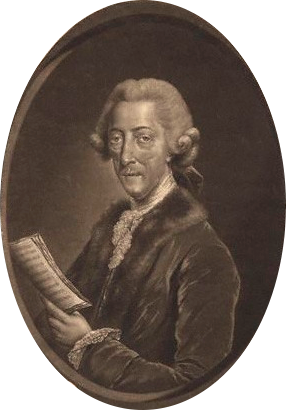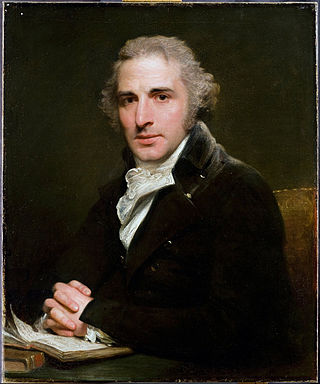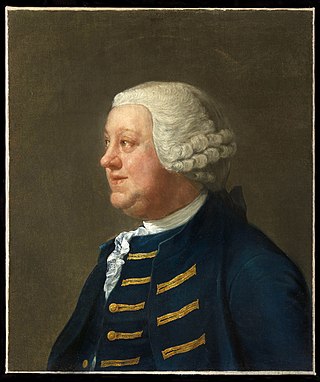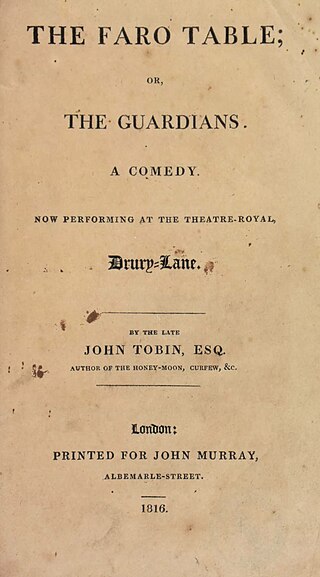Related Research Articles

Thomas Augustine Arne was an English composer. He is best known for his patriotic song "Rule, Britannia!" and the song "A-Hunting We Will Go", the latter composed for a 1777 production of The Beggar's Opera, which has since become popular as a folk song and a nursery rhyme. Arne was a leading British theatre composer of the 18th century, working at the West End's Drury Lane and Covent Garden. He wrote many operatic entertainments for the London theatres and pleasure gardens, as well as concertos, sinfonias, and sonatas.

Michael Arne was an English composer, harpsichordist, organist, singer, and actor. He was the son of the composer Thomas Arne and the soprano Cecilia Young, a member of the famous Young family of musicians of the seventeenth and eighteenth centuries. Like his father, Arne worked primarily as a composer of stage music and vocal art song, contributing little to other genres of music. He wrote several songs for London's pleasure gardens, the most famous of which is Lass with the Delicate Air (1762). A moderately prolific composer, Arne wrote nine operas and collaborated on at least 15 others. His most successful opera, Cymon (1767), enjoyed several revivals during his lifetime and into the early nineteenth century.

David Garrick was an English actor, playwright, theatre manager and producer who influenced nearly all aspects of European theatrical practice throughout the 18th century, and was a pupil and friend of Samuel Johnson. He appeared in several amateur theatricals, and with his appearance in the title role of Shakespeare's Richard III, audiences and managers began to take notice.

The Royal Opera House (ROH) is a historic opera house and major performing arts venue in Covent Garden, central London. The large building is often referred to as simply Covent Garden, after a previous use of the site. It is the home of The Royal Opera, The Royal Ballet, and the Orchestra of the Royal Opera House. The first theatre on the site, the Theatre Royal (1732), served primarily as a playhouse for the first hundred years of its history. In 1734, the first ballet was presented. A year later, the first season of operas, by George Frideric Handel, began. Many of his operas and oratorios were specifically written for Covent Garden and had their premieres there.

John Philip Kemble was a British actor. He was born into a theatrical family as the eldest son of Roger Kemble, actor-manager of a touring troupe. His elder sister Sarah Siddons achieved fame with him on the stage of the Theatre Royal, Drury Lane. His other siblings, Charles Kemble, Stephen Kemble, Ann Hatton, and Elizabeth Whitlock, also enjoyed success on the stage.

Bristol Old Vic is a British theatre company based at the Theatre Royal, Bristol. The present company was established in 1946 as an offshoot of the Old Vic in London. It is associated with the Bristol Old Vic Theatre School, which became a financially independent organisation in the 1990s. Bristol Old Vic runs a Young Company for those aged 7–25.

John Rich (1692–1761) was an important director and theatre manager in 18th-century London. He opened The New Theatre at Lincoln's Inn Fields in 1714, which he managed until he built the Theatre Royal, Covent Garden in 1732. He managed Covent Garden until 1761, putting on ever more lavish productions. He popularised pantomime on the English stage and played a dancing and mute Harlequin himself from 1717 to 1760 under the stage name of "Lun." Rich's version of the servant character, Arlecchino, moved away from the poor, dishevelled, loud, and crude character, to a colourfully-dressed, silent Harlequin, performing fanciful tricks, dances and magic. Rich's decision to be a silent character was influenced by his unappealing voice, of which he was well aware, and the British idea of the Harlequin character was heavily inspired by Rich's performances.

Joseph Grimaldi was an English actor, comedian and dancer, who became the most popular English entertainer of the Regency era. In the early 1800s, he expanded the role of Clown in the harlequinade that formed part of British pantomimes, notably at the Theatre Royal, Drury Lane and the Sadler's Wells and Covent Garden theatres. He became so dominant on the London comic stage that the harlequinade role of Clown became known as "Joey", and both the nickname and Grimaldi's whiteface make-up design were, and still are, used by other types of clowns. Grimaldi originated catchphrases such as "Here we are again!", which continue to feature in modern pantomimes.

The Theatre Royal, Drury Lane, commonly known as Drury Lane, is a West End theatre and Grade I listed building in Covent Garden, London, England. The building faces Catherine Street and backs onto Drury Lane. The building is the most recent of four theatres that stood at the location since 1663, making it the oldest theatre site in London still in use. According to the author Peter Thomson, for its first two centuries, Drury Lane could "reasonably have claimed to be London's leading theatre". For most of that time, it was one of a handful of patent theatres, granted monopoly rights to the production of "legitimate" drama in London.

Charlotte Charke was an English actress, playwright, novelist, and autobiographer. She began acting at the age of seventeen in breeches roles, and took to wearing male clothing off stage as well, performing and being publicly known as "Charles Brown" from 1741. Her later career and her writings were conducted under her own name, "Mrs. Charlotte Charke", and identified her as the daughter of Colley Cibber. After being unsuccessful in a series of jobs associated with men at the time, such as valet, sausage maker, farmer, and tavern owner, she succeeded in her career as a writer and continued her work as a novelist and memoirist until her death in 1760.

The patent theatres were the theatres that were licensed to perform "spoken drama" after the Restoration of Charles II as King of England, Scotland and Ireland in 1660. Other theatres were prohibited from performing such "serious" drama, but were permitted to show comedy, pantomime or melodrama. Drama was also interspersed with singing or dancing, to prevent the whole being too serious or dramatic.

Sarah Harlowe (1765–1852) was a popular actress of the London stage around the turn of the 19th century.

John Till Allingham was an English dramatist.
Benjamin Victor was an English theatrical manager and writer.

Richard Wroughton (1748–1822), was an actor, who worked mainly in Covent Garden and Drury Lane, and occasional in the city of his birth, Bath.

Francis Godolphin Waldron (1744–1818) was an English writer and actor, known also as an editor and bookseller.

William Wyatt Dimond was an actor and theatre manager of the late 18th-century whose career was largely based in Bath in Somerset.
The Vindictive Man is an 1806 comedy play by the British writer Thomas Holcroft.

The Faro Table is a comedy play by the British writer John Tobin. First written in the late 1790s it was initially agreed to be staged by Richard Brinsley Sheridan, the manager of the Theatre Royal, Drury Lane who then pulled out of the arrangement. Possibly this was because the character Lady Nightshade was too obviously based on Lady Sarah Archer, one of the Faro Ladies. It drew inspiration from Sheridan's The School for Scandal and particularly the character of Sir Oliver, who is here renamed Barton Around the time Tobin died of consumption he enjoyed great success with The Honey Moon leading to greater demand for his unstaged works.
Sarah Sparks (1754–1837) was a British stage actor. She was born Sarah Mills into a theatrical family, although no evidence exists linking her to the earlier actors John Mills or his son William Mills. Her first known performance was in Berwick in 1773, and she was married to the actor Hugh Sparks by 1776. From 1776 to 1794 she was a regular at the Theatre Royal, Edinburgh with her husband, as well as appearing in Chester and Newcastle.
References
- 1 2 Drury Lane Theatre. Decayed actors; fund. Petition of certain persons ... comedians at Drury Lane Archived 27 September 2006 at the Wayback Machine , House of Commons Committee report, 13 February 1776
- ↑
 This article incorporates text from a publication now in the public domain : "Hamilton, Mrs.". Dictionary of National Biography . London: Smith, Elder & Co. 1885–1900.
This article incorporates text from a publication now in the public domain : "Hamilton, Mrs.". Dictionary of National Biography . London: Smith, Elder & Co. 1885–1900.